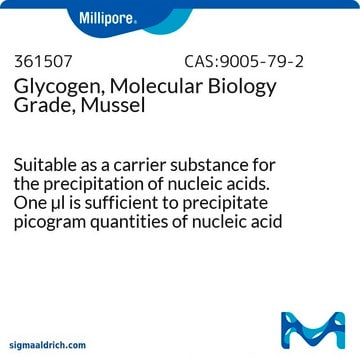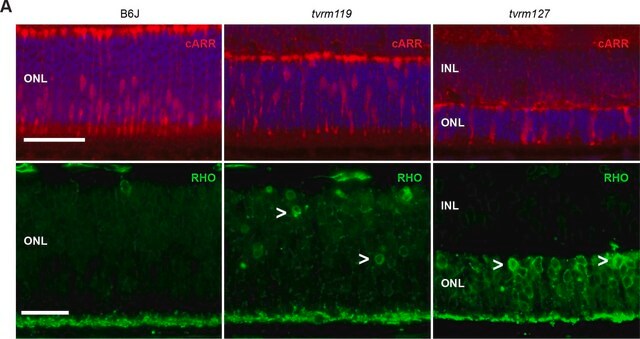G1767
Glycogen from mussel, Mytilus genus
for DNA precipitations
Sinónimos:
DNA and RNA precipitation
About This Item
Productos recomendados
grade
for molecular biology
Quality Level
form
liquid
packaging
vial of 1 mL
concentration
19-22 mg/mL
storage temp.
−20°C
InChI
1S/C24H42O21/c25-1-5-9(28)11(30)16(35)22(41-5)39-4-8-20(45-23-17(36)12(31)10(29)6(2-26)42-23)14(33)18(37)24(43-8)44-19-7(3-27)40-21(38)15(34)13(19)32/h5-38H,1-4H2/t5-,6-,7-,8-,9-,10-,11+,12+,13-,14-,15-,16-,17-,18-,19-,20-,21+,22+,23-,24-/m1/s1
InChI key
BYSGBSNPRWKUQH-UJDJLXLFSA-N
¿Está buscando productos similares? Visita Guía de comparación de productos
General description
Application
- as a coprecipitant in the isolation of RNA from hepatocytes and yeast cells.
- as a reference standard in calibration curve generation to quantify hepatic glycogen content.
- as a carrier molecule for DNA and RNA, replacing tRNA or sonicated DNA
- for the precipitation of DNA in the presence of ammonium acetate and ethanol or isopropanol
- for recovery of tRNA, yeast RNA, sonicated DNA and oligonucleotides as short as 8 base pairs
Biochem/physiol Actions
Features and Benefits
- product provided is 1 mL total volume
- precipitates even small amounts of DNA and RNA present in dilute solutions
- does not interfere with OD 260/280 readings
Principle
related product
Storage Class
11 - Combustible Solids
wgk_germany
WGK 3
flash_point_f
Not applicable
flash_point_c
Not applicable
ppe
Eyeshields, Gloves, type N95 (US)
Certificados de análisis (COA)
Busque Certificados de análisis (COA) introduciendo el número de lote del producto. Los números de lote se encuentran en la etiqueta del producto después de las palabras «Lot» o «Batch»
¿Ya tiene este producto?
Encuentre la documentación para los productos que ha comprado recientemente en la Biblioteca de documentos.
Los clientes también vieron
Nuestro equipo de científicos tiene experiencia en todas las áreas de investigación: Ciencias de la vida, Ciencia de los materiales, Síntesis química, Cromatografía, Analítica y muchas otras.
Póngase en contacto con el Servicio técnico












